The Summer 2011 Anime Preview Guide
Gia Manry
Gia may refer to any of the following: the Gemological Institute of America, Glasgow International Airport, Garuda Indonesia, and/or the associate editor of Anime News Network.

Kamisama Dolls Episode 2
Rating: 3.5
Kamisama Dolls' second episode does nothing to mitigate the feeling that Utao, the younger sister of protagonist Kyohei, belongs in a different show than the rest of the characters— her design is just odd.
This episode also introduces a new character, Kuuko, a college student and classmate of Kyohei and love interest Hibino's. Kuuko, who may be certifiably insane, runs the "True Science" club, which attempts to determine the truth behind seemingly supernatural mysteries. It's hard not to assume that she'll be playing the role of the nosy neighbor who snoops to figure out what's really going on among her friends.
There are a couple of higher points to the episode, however: Utao's idea to work on fine control of her Kukuri is clever. Towards the end there's also a hint that the kukuri isn't so completely devoid of its own spirit as Utao seems to interact with it...and it suggests that it wants to be near Kyohei, who we learn used to be a seki and presumably used to control the same kukuri.
The preview seems to indicate that the next episode will feature a bunch of slapstick goofiness and girl-bonding between Utao and Shiba, which is disappointing when the actual 'serious' parts of the show's story are considerably more intriguing than any of its characters so far.
Kamisama Dolls is available streaming on Crunchyroll

Cat God (Nekogami Yaoyorozu)
Rating: 3
Nekogami Yaoyorozu is the tale of Yuzu, a kind and gentle young woman whose life is overrun by Japanese gods, led by the titular cat god (nekogami) Mayu. Mayu crash-lands in the world of humans after being expelled from her godly parents' home for misusing her powers in a seedy gambling den, and living with Yuzu she starts to overspend, rendering the two broke. When word arrives that a poverty god(dess) is approaching the town, Mayu presents a united front with her divine pals: shrine-dweller Gonta, who has a crush on Yuzu, cat goddess Sasana, who is engaged to Mayu, and gothic lolita/destruction goddess Meiko, who also vies for Mayu's affections. Of course Yuzu winds up letting the poverty god, Shamo, into their home and bonds with her. It turns out that the Shamo is actually there to inspect the abilities of the aforementioned gaggle of gods, which she finds lacking. She decides to stick around for a bit.
There's nothing particularly outstanding about the show or its characters so far, but the writing of the show seems decent so far as several of the turns and bit were unexpected. Some of the characters are introduced better than others; Gonta and Sasana's entries are cute, but Meiko's feels half-hearted by comparison. The world setting is cute but vague; Yuzu wears old-fashioned duds, and everyone seems familiar with gods as real, tangible beings, but otherwise seems like a modern setting (or maybe a decade or so old? That video game Mayu was playing looked maybe 16-bit).
Some of the design elements are a little odd: all the cat gods have two tails (probably derived from the bakeneko cat monster of Japanese folklore, whose tail forks into two), and the cat gods also have this weird thing about wearing a belt around one ear. I guess the godly kimonos just didn't stand out enough? It's also a little odd that protagonist Mayu is the only character whose hair has the sort of plasticky stylization, while everyone else's has fairly normal shapes (for anime— Meiko has those mysterious bonus pigtails with no actual hair ties in sight). On the music front, it's all very catchy, but the opening has odd pacing; it keeps going on when you expect it to end, and then ends when you think it's about to go on.
Overall, Nekogami Yaoyorozu is unlikely to be anyone's top show of the season, but it's cute and harmless, mostly suitable for sort of idle watching/time killing.
Nekogami Yaoyorozu is available streaming on Crunchyroll

Manyuu Hiken-chou
Rating: 0
Manyuu Hiken-chou couldn't be more different from this season's Twin Angels: Sparkle Paradise in most ways, but the shows do have one thing in common: it's impossible to tell whether they're parodies played straight, or whether viewers are intended to take them at face value— and enjoy it.
Set in a female-dominated (read: cleavage-dominated) historical Japan, the talented and busty swordswoman Chifusa abandons her village and her also-buxom pal Kaede. Big-breasted antagonist Kagefusa, Chifusa's sister, rapes Kaede in an extended scene, claiming possession of her. It turns out that at least part of the reason Chifusa left is the family secret technique: cutting women's breasts in order to achieve power. Or something. There's also talk about plastic surgery. It's all kinds of confusing.
Chifusa survives her escape attempt thanks to the help of a young woman who turns out to have been a victim of the Manyuu village's "tit hunts," and there's even a surprisingly serious and touching moment between them, maybe three or four seconds. Then Chifusa's sister reappears, with a de-breasted Kaede (she was cut after attempting to follow Chifusa), and it all devolves into complete ridiculousness. It turns out that by cutting another woman's breasts, Chifusa can not only cause them to magically deflate, her own breasts inflate in return.
No, really.
It should be noted that Chifusa recognizes how completely stupid this whole thing is and is determined to change the world. Everyone else appears to have the brains of a turnip, and not much more personality— even the protagonist has little more than righteous outrage at being cast in such a warped world and guilt at being born to such a destructive family. Kagefusa and Kaede, the only other characters who appear to be of real note, have even less to work with. From a technical perspective, the show is well-animated and decently acted. You've also probably heard that the censorship in Manyuu Hiken-chou is overkill— it actually reminds me of the kind of silly glowing and sparkling you see in hentai DVDs. Come to think of it, Japan censors its hentai and live-action pornography, and some of the scenes are fairly explicit— one wonders how "uncensored" the eventual DVD/Blu-ray release will actually be.
There will definitely be people who manage to enjoy this show for mocking purposes, but it's hard to imagine many others getting into it; the premise is absurd, the fanservice is present but bizarrely obscured (not to mention that some viewers aren't into rape, girl-on-girl or otherwise), and its execution is almost completely lacking in (intentional) humor.

R-15
Rating: 1.5
20 seconds in and the first misty censor appears to block a young girl's naughty bits from view. Is that a record?
There is a lot of sex in R-15, most of which takes place in the mind of Taketo Akutagawa, a high school boy who's been working as a porn writer since middle school. He's hoping to have a slightly less solitary high school life than he did at his previous school by virtue of the fact that he attends "Inspiration Academy," a school populated only by geniuses. Every time Taketo spots one of his classmates doing something remotely sexy, he goes into fantasy mode and starts writing another porn story, on paper or in his head. But then something strange happens: after dealing with his crush, the whimpering clarinetist Fukune Narukara, he finds himself to write things...other than porn! And it feels oddly good!
There are another half-dozen girls who appear (briefly) in the show's first episode, and two of them show similar porn proclivities even while dressing Taketo down, presumably to prove his point about sex being part of humanity's core. All of them have a primary trait, related to their particular "genius" ability. Annoyingly Taketo's lone friend and the only other male character so far (other than the school's headmaster) Ritsu, a math genius, speaks in formulas, gets distracted when asked to recite pi, etc. It also looks like they're going to use him to drum up some BL fanservice, and one has to appreciate the equal opportunity. There's also some pretty decent voice acting— at least one of the girls (the one who "hates" Taketo) actually sounds like a normal human being.
As fanservice shows go, it's remarkable that the storyline about Taketo learning to focus on (and write about) something other than sex could prove endearing. However, it would have to be handled very well, e.g. without being either preachy or oblivious to the show's own nature. The odds are slim. That said, the first episode is otherwise a mish-mash of bland single-trait characters and fanservice, and the pacing is terrible— a buxom cheerleader appears for a mere 3 seconds, with no name eye-catcher like the other girls or anything. A similar thing happens with all the other girls, each displaying her "genius," her panties, and no real character, although the others all at least get the name plate. Our hero only actively interacts with three girls the entire episode.
For what it is, R-15 shows some potential to be better than the average fanservice show, but the obvious harem aspects and the attitude towards the equally sex-obsessed girls (and the implicit "they're just not being honest with themselves!" statement that goes with them) counteracts a lot of that. If what you're looking for is a coming-of-age harem comedy with explicit sex, this is as good as you're going to get in a TV series (pre-uncensored DVD release); no one should have any trouble figuring out what sex acts are taking place just because there's a white misty line across the screen. But while watching I found myself asking: why wouldn't the viewer give in and just pick up a hentai?
R-15 is available streaming on Nico Nico and Crunchyroll
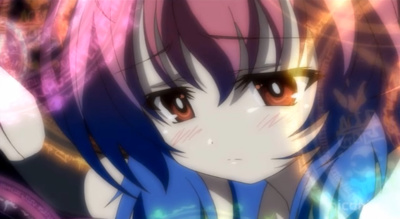
A Dark Rabbit Has Seven Lives
Rating: 2
Let's get this out of the way: folks, when an adorable little girl offers you poison so that you can never leave her, the correct answer is no, even if you both appear to be six years old.
Taito is a seemingly normal 15-year-old who gets hit by a van while trying to knock a loli character out of the way. Upon waking he finds that his body heals itself, and then remembers that nine years prior, he made a promise with a witch named Saitohimea, who has been waiting for him ever since. The two are finally happily reunited, and Taito will presumably have to reconcile this newly-remembered past with his normal high schooler present...once he's dealt with his popular classmate Gekkou Kurenai, who tries(?) to kill Himea at the end of the episode.
Itsuka Tenma no Kuro-Usagi, also known as A Dark Rabbit Has Seven Lives, could be a decent supernatural drama, but it suffers from two major problems: the first is pantyshots that, regardless of how you feel about fanservice in general, distract the viewer from the characters and their development. The second is poor pacing...it manages to feel both rushed and like the individual scenes are too long, like Himea's naked whining about being all alone while in some alternate dimension and Taito's running to try and find her after regaining his memories.
Other than this, the show's got some potential for its mystery, but feels oddly like a sequel. Add in that the characters are bland so far and you've got nothing much to go on.
A Dark Rabbit Has Seven Lives is available streaming on Nico Nico and Crunchyroll
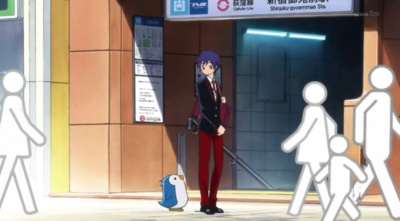
Mawaru Penguindrum
Rating: 4.5
What would you do if an adorable penguin started popping up in your life with things you've left behind, running errands, and killing cockroaches? What about three of them? And what if they were somehow involved with a medical miracle that saved your kid sister's life? And what if it turns out that you have to pay a price in exchange for that life? Such is the situation that brothers Kanba and Shouma find themselves in when their sister Himari wakes after being pronounced dead and starts talking about survival strategies and the "Penguin Drum."
Mawaru Penguindrum is without a doubt the most original-looking show so far this season, with Revolutionary Girl Utena director Kunihiko Ikuhara joining forces with designer Lily Hoshino to create a strange amalgamation of family tragedy, magical girls, and cute penguins. It's also hard to say exactly where the storyline is going so far, but easy to want to find out, as there's something for everyone here: pretty boys, a magical girl (a fairly adult-looking one, to boot), cute plushie-esque animals, vivid and colorful designs mixed with great animation, etc. (There's already a touch of potential incest at the tail end of the episode, along with hints that the price Kanba and Shouma will have to pay for their lives is steep. Viewers should prep not only for weird, but a solid side dish of dark as well. )
I can scrounge up two complaints: first, that some of the scenes are overly loaded with cute artifacts (as in the siblings' home) or simplified/stylized people crossing the scene, even in front of the characters. Second, Ikuhara throws a bunch of philosophy about an apple representing the universe into the mouths of a couple of little kids, which it must be said defies belief enough to make it seem a bit heavy-handed. Fortunately, that segment is brief.
Other than that, the episode gives the viewer the feeling that there's a great deal under the surface of what we've seen so far, instantly resulting in that sort of gleeful antsiness of wanting to see what comes next.

The Idolm@ster
Rating: 3
The first episode of The Idolm@ster is constructed to feel kind of like a reality show, where a viewer stand-in silently asks questions of 12 newbie idols, a producer, and an assistant at the fictional 765 Productions. The girls are all exactly the characters you'd expect— annoying/mischievous twins, a fanged animal lover, a wealthy heiress, several variations of space cadet, etc. There's nothing particularly special about them as characters, and at one section of the episode— when one character's hamster gets loose in the company's office and everyone is chasing it —the shrill nature of some of the voices really gets annoying. But by and large, for an episode whose primary purpose is to introduce 14 attractive females in less than 25 minutes, you have to give the show's production team some credit: they pull it off without making the episode seem overly packed or confusing.
Of course, this is still an anime based on a sim game in which the player manages a group of young girls who want to become stars. While there's relatively little fanservice (and that devoted to two of the slightly older-seeming girls), none of these ladies offers much by way of character beyond a select trait or two, and a couple of them are also dumb as toast. This show is also very friendly to the man-phobic: the narrator/cameraman isn't voiced at all, and when the production company's president speaks, he's only shown from the neck down...which actually feels very awkward.
Because of the construction of the first episode as an introductory vehicle (which is, to reiterate, nicely done), it's impossible to get a sense of how future episodes might go, making it tough to recommend or discourage. It sounds like kind of a cop-out, but the people who aren't interested in this show know not to watch it, and the ones who are interested probably already have. For those on the fence, The Idolm@ster looks like it's being made by competent animators who will make it a decent entry into its genre...but it's still sitting comfortably within the confines of that genre.

Mayo Chiki!
Rating: 2
Kinjirou Sakamachi is a high school student who lives with his sister and nosebleeds whenever a girl touches him. Subaru Konoe is a girl who has to pretend to be a boy so that she can continue her family's tradition of butlering for the Suzutsuki family. And stealing the show from both of them, for better or worse, is Kanade Suzutsuki, a secret sadist who is also the most popular girl in school. Of course, Sakamachi learns both of these secrets throughout the first episode of Mayochiki!. As for how Sakamachi learns the secrets: he tackles Konoe to save her from being hit in the head by a jar, and somehow manages to remove almost all of her top AND pants, landing with his hand on her boob, which gives a reflexive squeeze. After Konoe knocks him out, he wakes up chained to a bed in the infirmary while Suzutsuki shifts back and forth between being seductive and threatening.
Yes...it's that show.
This frantic fanservice comedy has a few good moments, such as when Suzutsuki briefly convinces Sakamachi that she's turned him into a cyborg, but by and large the jokes are neither great nor terrible. Voice actress Yuka Iguchi (A Certain Magical Index's Index) pulls off Konoe's boy/girl voice pretty well, and Sakamachi and Suzutsuki also sound pretty good. Sakamachi's overly hyper sister Kureha can be a bit grating but only appears briefly in the episode. By contrast, Suzutsuki's scene in the infirmary is decidedly too long, even though she has the most potential to be interesting so far.
As fanservice shows go, Mayo Chiki!'s start is neither promising nor god-awful, with solid pacing, okay (but not stand-out) animation, and so-so humor. It's a middling effort, but with no pretense of being any more than that.
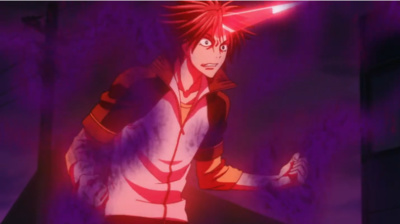
Sacred Seven
Rating: 1.5
Alma "I'm The Main Character Because I'm Two Feet Taller than Anybody Else" Tandoji has had a rough life. Ever since an incident three years ago in which he sent a whole batch of folks to the hospital, everyone around him is terrified of him...except for one inexplicably friendly classmate who gets it in her head that he should join the school's Rock Club, since he goes hunting for rocks in the river every day, or something. And then there's Ruri, a wealthy blonde who tries to conscript Alma and his unknown powers into her organization to save the world from an equally unknown threat. (Apparently convincing him involves having snipers on hand.) Alma rejects both, but winds up changing his mind when a Medusa-based rock monster appears and starts smashing stuff up: he runs head-first into the scene and performs a transformation that results in him destroying everything indiscriminately, barely avoiding smashing Ruri herself into a pulp. She unlocks his "true" powers with a crystal and he gets a better-looking transformation in which he keeps his mind and defeats the monster. Woohoo.
It's often said that "everything is derivative" nowadays, but Sacred Seven suffers from a terminal case of the lookalikes. Alma is some kind of Code Geass reject, while Ruri's mech-driving butler is Sebastian from Black Butler. Also working for Ruri are a team of maids reminiscent of the gothic lolita death squad from Coyote Ragtime Show (although it's notable that they wear sensible footwear — sneakers! Who'dathunk?) and some kind of mystical rock sculpture named Onigawara, who sounds a little like Natsume Yujincho's Nyanko-sensei but is way less useful. Even Ruri's method of transforming Alma looks swiped from a dozen magical girl shows, and the hand movement involved puts one in mind of Shugo Chara!.
The biggest problem is that every show mentioned in that last paragraph is more entertaining than the first episode of Sacred Seven, which is so generic that you can almost imagine the committee which created it. "Hmm...we need a motif. Hey, has anyone done rocks yet?"
It's possible that the show will develop into something that stands out more, but so far not a single character, plot element, or even line of dialogue is original enough to warrant giving Sacred Seven more than a passing glance.
Sacred Seven is available streaming on Hulu and Crunchyroll

No. 6
Rating: 4.5
It's a surefire sign that romantic notions will take the lead when someone reduces the human soul or spirit to scientific jargon in the first few minutes of a show, and No. 6 is unlikely to be an exception. Protagonist Shion lives the privileged life of an elite, intelligent young man in the titular No. 6, one of the six remaining inhabitable areas of a futuristic, technologically advanced world. He's a bit spacey, but intelligent and curious about the world. When a mysterious and injured young man named Nezumi drops in on him, Shion helps the kid out, even after learning that he's an escaped criminal. Nezumi is perplexed by Shion's generosity, and in his defense, Shion's response to being manhandled is to ask whether there's a physiological trick to his sudden inability to move. (In other words, Shion is an oblivious nerd.)
This was definitely one of the better first episodes so far this season, with just enough setting and character development to put the story into place without overloading the viewer. It may not entice everyone from the get-go, though, as all there is to be curious about so far is whatever conspiracy is behind Nezumi's appearance...and maybe how the two come to look as they do in the promo art and opening/ending sequences.
Visually, it's tough to top one of Fuji TV's Noitamina shows, and No. 6 is beautifully designed and animated. The voice cast is okay, but Nezumi's is very deep for a kid his age— maybe to further the idea that he's more mature and street-smart than the intelligent but naive Shion. Shion's gal pal Safu has the potential to either be really cool or really irritating— she's also a complete nerd, referring to her smooching Shion's cheek as part of her "reproductive response," but on the other hand, she almost certainly has a crush on him.
No. 6 has an interesting vibe; the futuristic conspiracy feels like a bit of Eden of the East while Shion's gleeful response to the outdoors and nature (even a typhoon) put me in mind of a Hayao Miyazaki work. If it fulfills the promise of the first episode, this will definitely be one to watch.

Blood-C
Rating: 2.5
It should come as no surprise that CLAMP's take on Saya— a heroine who originated as a quiet badass in the original Blood: The Last Vampire —appears as a clumsy miko (priestess) in Blood-C. She's also a goodie-two-shoes who's always late to school due to helping old ladies, finding lost children, or throwing away trash that's been left on the street. Oblivious to her friends' adoration or the class Nice Guy's crush, Saya is a walking ball of cheery cliché for the first 12 or so minutes of the first episode. There's even an overly long scene of her singing on her way to school. One practically expects birds and kittens to flock to her a la Snow White or Sleeping Beauty.
After school, however, Saya's father gives her a sword so that she can go kill an "aged one," a monster that starts out as a statue and transforms into something vaguely bug-like (it has pincers). The contrast between day Saya and night Saya isn't as notable as one might like: other than her willingness to get her uniform dirty with the creature's blood, she's still the same daddy-loving sweetie pie, more or less.
It's too early to tell whether Production I.G and CLAMP will break Saya out of the sort of flawless-princess cage she's in, but she's not the only stereotype in the show. She has a thoughtful but austere father and a pair of already-annoying twins and a “big sister” figure as best friends. Rounding out the cast are the Nice Guy, who has a crush on Saya, a mysterious tall/dark/handsome classmate, and a kindly neighbor who runs a restaurant. None of them are worth writing home about.
Where the show is strong is in its visual components: the animation is smooth and CLAMP's designs are attractive, as to be expected. In the battle scene, one or two of the shots are unexpected and striking as a result. On the audio front, the rambunctious twins' voices are annoying, which matches their personalities. Much-promoted voice actress Nana Mizuki is solid, but not amazing, as Saya. As for music, the intro and battle music is quite generic (it made me think of InuYasha and other shows with music by Kaoru Wada, although he's not the composer on this show).
In short: nothing in Blood-C is particularly "bad," but there's nothing here to recommend either, except CLAMP and I.G's visuals.
Blood-C is currently available streaming at Nico Nico
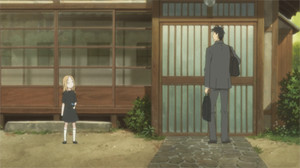
Usagi Drop
Rating: 4
Daikichi is a Japanese businessman who attends his grandfather's funeral only to learn that the 79-year-old man left behind some unfinished business: his young and illegitimate daughter, Rin. After observing Rin being adorable throughout the overnight funeral process, Daikichi sits in on his family's meeting, wherein everyone tries to explain why they can't take the kid in. Frustrated by one relative's suggestion of putting Rin in a facility— on top of having had to deal with how bratty his niece Reina is —Daikichi, of course, volunteers to care for Rin.
As first episodes go, Usagi Drop's is one of the better ones: it doesn't try to force the introduction of too many characters or too much plot, preferring simply to set up the main scenario. There are plenty of other people around, but you aren't really expected to retain who they are beyond perhaps their relationship to Daikichi.
Rin is a quiet child (the rest of the family seems to think she can't talk or is a slow learner) who opens up to Daikichi somewhat throughout the episode. He is, in fact, the only person she talks to directly. Of Daikichi's personality we learn little except that he's a bit reckless, both in his speech (he offers “props” to his grandfather's virility) and his willingness to take on the task of raising a child so suddenly. There's not a lot to work with yet, but there's certainly the promise of more.
Visually, Usagi Drop starts out with an artsy-stylized look that it drops as soon as the opening theme begins, which is good— much longer and it would have gotten rather irritating. The audience isn't treated to a lot of voices, as both Rin and Daikichi serve first and foremost as observers, but what we do hear sounds appropriate so far, if not particularly outstanding.
If anyone was expecting a wacky comedy about an unprepared guy having a kid dumped on him and hijinks ensue, this isn't it. So far the show presents itself as a thoughtful drama, and its first episode is even a bit melancholy at some points (it is, after all, set at a funeral), so viewers seeking some action may want to hold off until they're in the mood for something more sedate.
Usagi Drop is available streaming on Crunchyroll
Summer 2011 Shorts
 Morita-san wa Mukuchi
Morita-san wa Mukuchi
Rating: 2
Mayu Morita is a normal high school girl who almost never speaks out loud. Her best friend Miki is a complete chatterbox who fills all of Mayu's silence with inane talk about cute boys and actors. Meanwhile, a voice-over informs us of some of Mayu's thoughts, which primariliy concern having to be polite while waiting for Miki's latest rambling to end. And you get three minutes of this! (Minus the 30-second opening sequence.)
The show isn't very funny or creative, but there's a certain charm to Mayu's facial expressions that must be the show's intended primary draw. It sort of works, but the episode ends rather suddenly, leaving the viewer to wonder what was the punchline— or the point.
 Nyanpire the Animation
Nyanpire the Animation
Rating: 1
Nyanpire the Animation is a series of flash-animated shorts about a cat who was dying in the streets until a vampire decided to save her by making her a cat-vampire. Apparently managing to be adopted, the newly dubbed "Nyanpire" throws tantrums while demanding blood for dinner and tries to raid the blood-less refrigerator.
It's a little weird to imagine who Nyanpire is for. It airs on Japan's Kids Station, and it's not like vampires haven't popped up in children's cartoons for decades. But heavy focus on the actual blood-drinking seems a little odd for young kids, while there isn't enough parody to make it amenable to older fans.
For purely aesthetic purposes, fans of the current popular cute-goth style (like all those cutesy skulls popping up everywhere) might find it worth checking out the episode, but there are plenty of better cat shows and better vampire shows out there. If you do try it, note that the last 90 seconds of this four-and-a-half minute episode is devoted to an ending theme/music video that is pretty obnoxious.

Natsume Yujincho San
Rating: 4.5
Natsume is an orphan who has bounced from relative to relative all his life thanks to his ability to see and interact with youkai (demons, more or less), which makes him seem weird to others. At the start of Natsume Yujincho's third season, he has managed to settle down with some kindly relatives on his grandmother's side of the family, and has even made friends at school and with some of the local youkai. Unfortunately, he has also become the target of other youkai thanks to his ownership of the "Book of Friends," in which his grandmother— also cursed with the ability to see youkai —magically stores the names of all of the youkai she defeated in battle, allowing her to call them at will. While some youkai have figured out that they can ask Natsume for their names back, others prefer to just attack. Fortunately, Natsume has struck a bargain with "Nyanko-sensei," a demon who normally takes the shape of a fat cat, to protect and educate him.
There is something inexplicably relaxing about watching an episode of Natsume Yujincho, even when that episode contains a couple of youkai battles. Ultimately, most episodes end with a certain feeling of both melancholy and peace, not entirely unlike another supernatural series, Mushishi.
If you haven't started the show yet, you can certainly pick it up at the start of the third season; it gives you plenty of explanation as to what's going on while also providing an entertaining story for the show's regular fans. Although it's still confusing as to why Nyanko-sensei protects Natsume outside of liking him; if the demon gets Natsume's book when the kid dies, why protect him? Especially since with every episode the book becomes less powerful as Natsume returns other demons' names. The secret, one supposes, is that Nyanko-sensei is both a big fat softie and a terrible liar.
Beyond that, though, Natsume has settled comfortably into its niche as a charming and entertaining supernatural show with beautiful designs and strong, unpretentious writing.
Natsume Yujincho San is available streaming on Crunchyroll

Twin Angel Twinkle Paradise
Rating: 0
You know that show that non-anime fans vaguely imagine anime as being? The one always parodied by fictional anime-within-anime (like Genshiken's Kujibiki Unbalance)? High-pitched, overly colorful, and usually mind-numbingly stupid? This is that show.
Aoi and Haruka are middle school girls who are also secretly magical girl "Phantom Thieves" who, in fact, stop thieves trying to target their school, which houses one of seven amulets that, when combined, give the bearer immense powers which could fall into the wrong hands, etc. There's no introduction given or necessary in this first episode, although it's of note that there's a 2008 OAV that predates this television series. (Both are based on a pachinko slot game, of course.) Aoi and Haruka are supported by their school's headmistress and her butler, as well as a Tuxedo Mask clone who happens to look similar to an upperclassman at their school. The antagonists of the episode are a gothic lolita named Salome (ahem) and a guy in a military outfit who is in love with her.
Is Twin Angel Twinkle Paradise a magical girl ripoff, or a magical girl parody? It's impossible to tell, with a few things that could be considered parody elements— a butler who always arrives via trap door and villains who float away in a hot air balloon a la Pokémon's Team Rocket —but there's not quite enough of the goofiness to settle the show firmly into parody category. (Even winter's Rio - Rainbow Gate! was more arguably a spoof.)
Someone will surely enjoy watching this show in order to make fun of it, but it's almost unnecessary. One secret weapon that the villains use against the "Angels" is a gas that turns them into cat girls, followed by a variety of kitty treats and toys to distract them. On top of that, the animation is mediocre and the voices shrill; the opening theme sounds in some parts like a rejected track from an Alvin and the Chipmunks album.
Seriously: this experience is painful. Watch with caution.
Twin Angel Twinkle Paradise is available streaming on Nico Nico

Kamisama Dolls
Rating: 4
Whatever you might expect from a show whose promo art features a little girl and a large-breasted woman being carried by a giant magical doll, Kamisama Dolls probably isn't it. After starting with a series of violent images, the first episode introduces Kyohei Kuga, a young man from an old-fashioned rural Japanese village who has moved to Tokyo. One night while out drinking with friends, Kuga and his coworker Shiba Hibino, whose father is also from Kuga's village, discover a horribly mutilated body in an elevator. That same night Kuga has several visitors: first his little sister Utao comes along with her kakashi, the giant doll/god which Utao, as a "seki," can control. Shortly after her arrival we meet Aki, another seki who has some kind of bone to pick with Kuga, naturally. After a bit of fighting, Kuga's apartment is left a complete wreck, so he and Utao move in with Hibino and her father.
There is an odd contrast between Utao and all of the other characters shown so far. Perhaps the animators were just trying to make her look young, but the wide eyes and blue hair make her look like she was drawn in a different style entirely from the adult characters. It doesn't help that twice during the otherwise serious battle scene, she goes into an angry "chibi" form, first when she accidentally gives Aki a view of her underpants, and again when Kuga holds her by the chest after protecting her from being thrown against a wall.
Utao may feel oddly placed here, but beyond that the episode sets up what has the potential to be an interesting story. The show is in no hurry to reveal all of its secrets via straight explication, although it's not hard to guess where it's going, and there's already an interesting confusion over who might turn out to be the true antagonist: the violent Aki, or the ominous-sounding village shrine that sends orders to its inhabitants past and present throughout the episode. Viewers who check out Kamisama Dolls will also be treated to the most unique opening so far this season, which sounds like an odd mix of contemporary Japanese pop and a Gloria Estefan song. .hack fans will also recognize the vocals of Chiaki Ishikawa in both the opening and ending.
All in all, the show has great animation, an interesting story, and only one of the four main characters (so far) is annoying, so it shows a lot of promise.
Kamisama Dolls is available streaming on Crunchyroll

YuruYuri
Rating: 2
Every season seems to have at least one slice-of-life comedy revolving around a group of girls who seem to do very little, and one of this season's is YuruYuri. This time the show is set in middle school, and it also promises to turn the girl-on-girl action up a couple of notches.
The main character, Akari, is a well-meaning, energetic, but ditzy girl who joins her two friends— doujinshi-drawing magical girl lover Kyoko and Yui, who passes for "normal" for the time being —in their club, which is devoted to goofing off. A fourth girl named Chinatsu who happens to look like Kyoko's favorite magical girl also joins, cuing an overly-long couple of scenes devoted largely to Kyoko trying to cuddle up with her. Also of note are not one but two segments in which Akari wails loudly for considerably longer than any human should have to listen.
While the first half of YuruYuri's first episode is utterly generic, some fans will get a chuckle out of the second half, in which the girls try to come up with a way to help Akari have more "presence." The fun-poking is presumably aimed at committee-driven character development, and Kyoko's presentation of the traits that make a good protagonist (read: a list of fiction clichés) is cute, but not really strong enough for any out-loud laughing.
Another credit to the show is its introduction of secondary characters; it's content to give us a couple of lines and some background action to let us know that two of Akari's classmates will pop up more later rather than forcing a weaker, more formal introduction. Another character who will clearly appear is Akari's sister, who is not seen in the episode but whose primary trait (sister complex!) is firmly established.
Unfortunately, these elements alone aren't enough to make YuruYuri recommendable on the grounds that the characters we DO spend the episode with, i.e. the main ones, aren't interesting or funny in the least. The show will no doubt be compared to the long line of similar shows that came before it; even elements of the design and animation are reminiscent of Lucky Star and Hidamari Sketch, but so far it doesn't have anything to offer that hasn't been done better before.
YuruYuri is available streaming on Crunchyroll
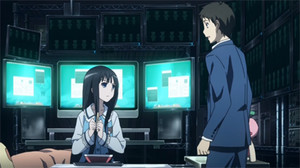
Kami-sama no Memo-cho
Rating: 4
Setting aside the confusion of whether someone who is employed as a freelance detective can actually be considered a NEET ("Not in Education, Employment, or Training"), Kami-sama no Memo-cho offers up a collection of semi-employed teens led by Alice, a pajama-clad computer geek who only rarely leaves her apartment. High school student (and therefore non-NEET) Narumi's chipper classmate shoves him into Alice's circle of misfits, and he allows himself to be absorbed into the group and its current case, which revolves around a high school girl who is prostituting herself out.
While Alice's sudden liking of Narumi feels somewhat unmotivated— she tackles him upon their second meeting so that she can cry about a broken toy, even though someone she's known longer is also available at the time —the mystery they solve with the help of Alice's crew is solidly written and engaging. The concept of the over-achieving, seemingly perfect high school girl participating in "compensated dating" pops up often enough in anime and manga that it could feel clichéd to some, but Kami-sama's staff manage to pull the story off.
Another potential complaint is Alice's lengthy philosophical diatribes, which can become a bit preachy, but by and large the episode features a good story, supported by strong visuals and voice acting.

Uta no Prince-sama
Rating: 2
If you ever wondered whether male idols in Japan have to do awkward-looking dance moves when performing, congratulations! Uta no Prince-sama will show you.
The show's story revolves around the sweet and decidedly fragile Haruka (she falls! She faints! She helps lost children!), who manages to test into an exclusive boarding school for would-be idols and pop composers. The school is run by colorful pop singer professors, including the exuberant Norio Wakamoto as its headmaster. The show knows its audience well and wastes no time filling the screen with a half-dozen pretty boys, one for every taste: the cheery one, the sparkly one, the aloof one, the short one, the cute-loving one, and the mysterious one. It doesn't take long for all of them to throw themselves at Haruka, ignoring her smokin' hot redhead friend/roommate, just to make sure you know that Haruka is something special.
It's commendable that Haruka gets some solo screen time to reveal the reason behind her interest in creating music (she wants to write a song for her own favorite pop idol, whose music saved her from fainting in the streets of Tokyo once upon a time). In fact, she's the only character who gets any developing in the first episode, as the rest is devoted to introducing all of the "zany" characters (who are too numerous to get much more than a name and primary character trait so far).
As a pop music-focused harem show, Prince-sama's highest priority is to provide some engaging video and audio for the audience, dropping pacing and storyline to the secondary tier of importance, and it shows in this attractively-animated but otherwise generic first episode.
Uta no Prince-sama is available streaming on Nico Nico
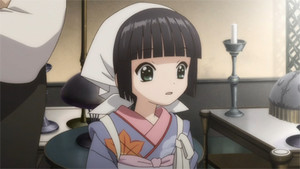
Ikoku Meiro no Croisée
Rating: 3
Ikoku Meiro no Croisée is set in 19th century Paris, where a very young Japanese girl named Yune lives and works as an unpaid servant at a family's metal-working shop. The shop is owned by the elderly Oscar but manned primarily by his grandson Claude, who handles all of the shop's actual crafting. The first episode could serve as its own cute short story as Claude starts out skeptical of Yune's presence, but is eventually won over by her sincerity.
Visually, the show is engaging, with lush period details all over the place. Fans of shows like Victorian Romance Emma will want to at least take a look. So far, however, the show's only known conflict is resolved with lightning speed, so it's hard to tell whether the primary focus of the series will be something ongoing, or just episodic cultural and personal misunderstandings between Claude and Yune. In the first episode, Yune's kimono catches on one of Claude's pieces, smashing it on the floor, and he is forced to remake it from scratch. To make up for it Yune gives him one of her prized kimonos to sell, which turns out to have been a family heirloom, leaving Claude feeling like the guilty party.
This plot takes up only a portion of the episode, the rest being reserved for introducing the characters and setting. However, there is one confusing technical element to the episode, which is language. In reality all of the characters speak Japanese, but they are of course supposed to be speaking French. There's no obvious indication when the characters switch from French to Japanese.
The first episode is probably worth a watch for its sheer prettiness, but it lies flat in providing a sense of conflict or drama to be had in future episodes. Still, Yune's introduction to French culture is adorable, and the show doesn't seem to be aiming for much more than that.
discuss this in the forum (448 posts) |
this article has been modified since it was originally posted; see change history
back to The Summer 2011 Anime Preview Guide
Season Preview Guide homepage / archives